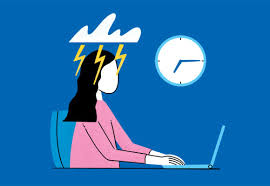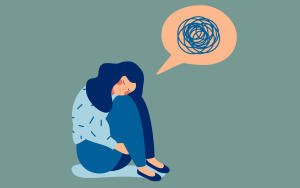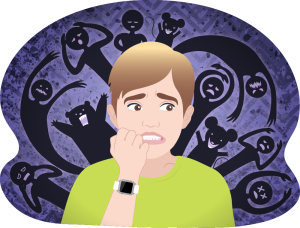Do you ever feel overwhelmed and stressed out? Do you sometimes feel like you can’t cope with all the demands on your time and energy? If so, you’re not alone. Stress is a common problem that many people experience. But what about anxiety? What’s the difference between stress and anxiety, and how should you handle them both? In this blog post, we will explore the differences between stress and anxiety, as well as some tips for managing each one.
Stress is a normal response to challenging or threatening situations. It can be helpful in that it can motivate us to take action and deal with difficult problems. However, if stress becomes too frequent or intense, it can become a problem. Anxiety is similar to stress, but it involves feelings of fear and worry that are out of proportion to the situation. Anxiety can be paralyzing and make it difficult to cope with daily life.
What Is Stress?

Stress is your body’s way of responding to any kind of demand or challenge. There are many reasons people might move. Some good reasons are getting a promotion at work or moving to be close to family after someone dies. Any event or change that disrupts your normal routine can cause stress.
The body’s response to stress is called the “fight or flight” reaction. When you’re stressed, your heart rate speeds up and your blood pressure goes up. Your muscles tense up. You might start to sweat. These are all designed to help you either fight or run away from whatever is causing the stress.
What Is Anxiety?

Anxiety is the feeling of worry, fear, or unease that can be mild or severe. Many people feel nervous when they are in a new situation. For example, before a test, or when they meet someone for the first time. But if you feel really nervous all the time, and it makes it hard for you to do things like go to school or spend time with your friends, then maybe you have an anxiety disorder.
Anxiety disorders are the most common mental illness in the United States. About 18% of adults have one. That’s about 40 million people!
How Are Stress and Anxiety Different?
![]()
The main difference between stress and anxiety is that stress is a response to a situation, while anxiety is a feeling that lasts long after the stressful event has ended.
Furthermore, when you’re stressed, the feeling usually goes away once the situation is over. But when you have anxiety, it can be hard to control. It might make your daily life difficult.
Differences In Symptoms
Symptoms Of Stress

- Increased heart rate: When you’re stressed, your heart rate speeds up. This is because the body prepares itself to either fight or flight.
- Increased blood pressure: When you’re stressed, your blood pressure goes up. This is because the body wants more oxygenated blood to be sent to the muscles so that they can prepare for action.
- Tensed muscles: When you’re stressed, your muscles tense up. This is because the body wants you to be ready to fight or flight.
- Sweating: When you’re stressed, you might start to sweat. This is because the body releases sweat in order to cool down.
Symptoms Of Anxiety

- A feeling of worry or fear that lasts long after the stressful event is over: This is the main difference between stress and anxiety. With stress, the feeling usually goes away once the situation is over. But with anxiety, it can be hard to control and might make your daily life difficult.
- Difficulty concentrating: Anxiety can cause you to have difficulty concentrating on things. This is because when you’re anxious, your mind is constantly going over the things that are worrying you.
- Restlessness: Anxiety can also cause you to feel restless. This is because when you’re anxious, you might not be able to sit still and might want to keep moving.
- Irritability: Anxious people can often be irritable. This is because when you’re anxious, everything seems like a big deal and it’s hard to control your emotions.
- Muscle tension: Anxiety can also cause muscle tension. This is because when you’re anxious, your muscles are always tense and ready to take action.
Differences In Causes
Causes Of Stress
- External factors: External factors are things that happen outside of your body and are usually out of your control. Some examples are getting a promotion at work, moving to be close to family after someone dies, or starting a new job.
- Internal factors: Internal factors are things that happen inside of your body and are usually within your control. Some examples are getting sick, having a disagreement with a family member, or feeling overwhelmed.
Causes Of Anxiety
There are many different causes of anxiety. Some people develop anxiety due to a traumatic experience, such as a natural disaster or being in a car accident. Others may have an inherited disposition towards anxiety disorders. Genetics can play a role in whether someone is more likely to experience anxiety problems. Consequently, these factors that may contribute to developing an anxiety disorder include:
- stressful life events
- childhood abuse or neglect
- having a mental illness, such as depression
- substance abuse
Difference In Handling Both Of Them
How To Handle Stress?
There are many ways that people deal with stress. Some common methods include:
- Yoga: Yoga is a form of exercise that incorporates stretching and deep breathing. It can be helpful in relieving stress and tension.
- Meditation: Meditation is a practice that involves focusing on one’s breath or thoughts to achieve a state of relaxation.
- Journaling: Journaling can be a great way to release bottled-up emotions and relieve stress. It can also help to track progress in managing stress.
- Listening To Music: Listening to calming music can be a great way to relax and relieve stress.
- Exercising: Exercise is a natural way to release endorphins, which have mood-boosting effects. It can also help to improve self-confidence and body image.
- Talking to friends or family members: Talking to someone about what is causing stress can be helpful in relieving it.
- Eating healthy foods: Eating healthy foods can help to improve mood and energy levels.
How To Handle Anxiety?
If you are struggling with anxiety, there are many ways that you can handle it. Here are a few suggestions:
- Talk to someone about your feelings. This could be a friend, family member, therapist, or any other support system. Talking openly and honestly about how you’re feeling can help to reduce the stress and anxiety that you’re experiencing.
- Identify your triggers. Once you know what sets off your anxiety, you can work to avoid or manage those situations. For example, if crowds make you anxious, try to plan activities and trips that don’t involve large groups of people.
- Practice relaxation techniques. There are many different ways to relax, and you may need to experiment until you find the techniques that work best for you. Some people find relief through yoga, meditation, or deep breathing exercises.
- Engage in physical activity. Exercise is a great way to release tension and stress, and it can also help to improve your mood. If you’re not sure where to start, try taking a walk or going for a light jog.
Differences In Risk Factors
Risk Factors Of Stress
A person’s risk for experiencing stress is influenced by a variety of factors, including personality traits, family history, and life experiences.
Risk Factors Of Anxiety
Anxiety disorders are highly heritable- that means they run in families. If you have an anxiety disorder, it is likely that one or more of your close relatives also has an anxiety disorder.
Difference In Treatment Options
Treatment Options For Stress

There are many different ways to treat stress, including lifestyle changes, therapy, and medications.
- Lifestyle style changes: One of the best ways to manage stress is by making some lifestyle changes. This includes things like exercise, relaxation techniques, and healthy eating.
- Therapy: If lifestyle changes don’t help, you may need therapy. Therapy can involve talking with a therapist or counselor one-on-one or in a group setting.
- Medications: If lifestyle changes and therapy don’t help, your doctor may prescribe medications. There are many different types of medications that can help with stress, including antidepressants, anti-anxiety drugs, and beta-blockers.
Treatment Options For Anxiety

There are also many different ways to treat anxiety disorders. The most common treatments are medication, therapy, and lifestyle changes.
- Medications: The most common type of medication used to treat anxiety disorders is an antidepressant medication. These medications help to correct the chemical imbalance that may be causing your symptoms.
- Therapy: Therapy is also a common treatment for anxiety disorders. This includes things like cognitive-behavioral therapy (CBT) and exposure therapy.
- Lifestyle Changes: Lifestyle changes can also be helpful in treating anxiety disorders. This includes things like exercise, relaxation techniques, and healthy eating.
Helping Someone Deal With Stress And Anxiety

If you know someone who is struggling with stress or anxiety, here are some things you can do to help them:
- Encourage them to seek treatment. Many people who struggle with stress and anxiety do not seek treatment because they do not know that there are treatments available.
- Suggest lifestyle changes. Lifestyle changes can be helpful in managing stress and anxiety. This includes things like exercise, relaxation techniques, and healthy eating.
- Offer support. Let the person know that you are there for them and that you will help them through this difficult time.
- Do not judge them. People who struggle with stress and anxiety are often judged by others. Do not add to this by judging them yourself.
- Be patient. It may take some time for the person to get better. Be patient and supportive during this time.
Conclusion
The brain is always on, constantly processing information. There are many things that can make us anxious or stressed. It is hard to know how to deal with them. Moreover, there are some tips that can help you reduce your stress. Try them next time the pressure is too high. Some people find relief by going for long walks outside. Others have found solace in meditation. And others prefer seeking out new experiences like volunteering at their favorite charity organization. No matter what method you choose, give yourself permission today to take care of yourself so that you can do more good than ever before tomorrow.
A Word From Therapy Mantra
Your mental health — Your psychological, emotional, and social well-being — has an impact on every aspect of your life. Positive mental health essentially allows you to effectively deal with life’s everyday challenges.
At TherapyMantra, we have a team of therapists who provide affordable online therapy to assist you with issues such as depression, anxiety, stress, workplace Issues, addiction, relationship, OCD, LGBTQ, and PTSD. You can book a free therapy or download our free Android or iOS app.


